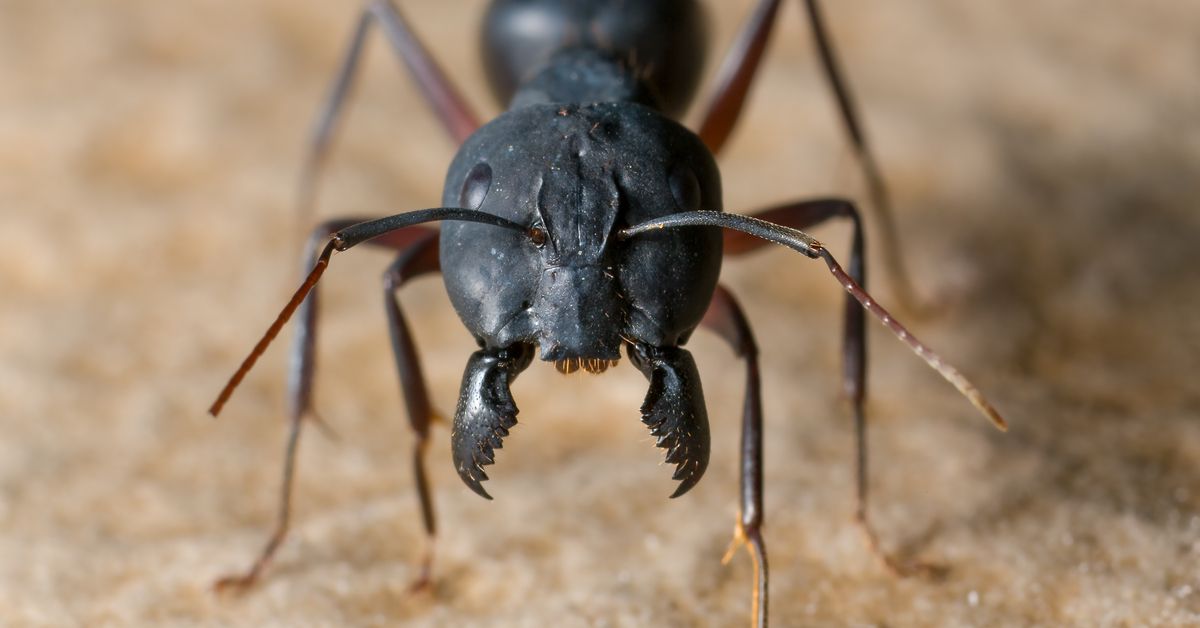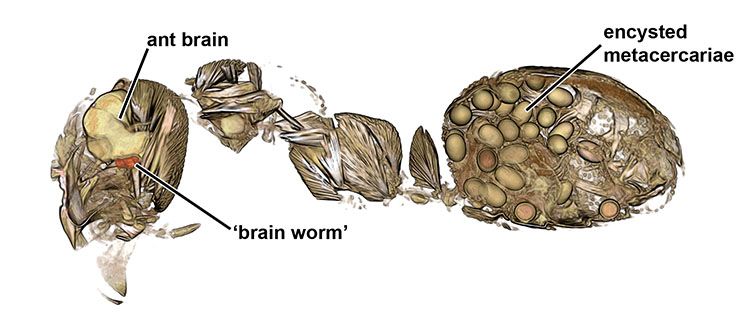An ant cannot get into your brain, even if it goes into your ear. While it might cause discomfort, it cannot reach your brain.
Insects like ants may find their way into unexpected places, causing concern and discomfort. It is common to wonder about the potential risks or harm that could result from such situations. However, understanding the limitations and capabilities of insects can alleviate such concerns.
This knowledge empowers individuals to take appropriate actions to prevent and address such occurrences effectively. This article aims to provide insights into the fascinating world of insects and dispel any myths or misconceptions surrounding their interactions with humans. By exploring these topics, a clearer understanding of insect behavior and its implications can be gained.

Credit: bekindminds.com
The Myth Of Ants Getting Into Your Brain
Contrary to the popular myth, ants cannot enter the human brain through the ears. There is no direct route from the ear canal to the brain in a living person. Even though it may appear likely, it is not physically possible for ants to crawl into your brain and cause harm.
Can Ants Really Get Into Your Brain?
Ants are incredible creatures with their unique abilities and complex societies. However, one of the most enduring myths about ants is the idea that they can crawl into your brain through your ears. This notion has been perpetuated for years, causing fear and unease among many people. Today, we will debunk this myth and examine the truth behind it.The Dangers Of Ants In Your Ears
While ants are known for their impressive strength and perseverance, they are not capable of finding their way into your brain through your ears. In fact, the human ear is not a direct pathway to the brain, contrary to popular belief. The ear canal ends at the eardrum, which acts as a protective barrier preventing any foreign objects or insects from entering deeper into the head.It is essential to understand that the human body has various mechanisms in place to defend against such intrusions. For instance, the ear produces earwax to trap any debris and prevent insects from advancing further. The natural movement of the jaw and ear canal also helps to expel any foreign objects that may enter.So, while an ant may accidentally find its way into your ear, it will not be able to penetrate the eardrum to reach your brain. The discomfort caused by an ant in your ear is undoubtedly unpleasant, but rest assured, it poses no threat to your brain.In rare cases where an ant does enter your ear, it is necessary to seek medical assistance for safe and proper removal. Attempting to remove the ant yourself may lead to further complications, such as pushing it deeper into the ear canal or damaging the eardrum.In conclusion, the idea of ants crawling into your brain is nothing more than a myth. The human body is designed to protect itself against such intrusions, making it highly unlikely for ants to reach the brain through your ears. So, next time you come across this myth, you can confidently debunk it and put your mind at ease.Ant Behavior And Biology
Ant behavior and biology play a crucial role in understanding how these tiny creatures interact with their environment and potentially with humans. Ants are social insects that exhibit complex behaviors and possess unique anatomical features that enable them to thrive in diverse ecosystems.
Understanding Ant Behavior
Ants follow a highly organized social structure within their colonies, with various roles such as workers, soldiers, and the queen. Ants communicate through pheromones, which are chemical signals that help them convey information about food sources, danger, and other essential aspects of their environment.
Anatomy And Capabilities Of Ants
Ants have distinct body segments, including the head, thorax, and abdomen, each serving specific functions in their daily activities. They possess strong mandibles that aid in tasks such as foraging for food, building nests, and defending the colony against threats.
Human Anatomy And Ear Structure
The human ear is a complex organ that plays a vital role in our auditory system. It consists of three main parts: the outer ear, middle ear, and inner ear. The ear not only helps us hear sounds but also aids in maintaining balance and spatial awareness.
Exploring The Human Ear
The ear canal is a narrow passage that leads to the eardrum, which separates the outer and middle ear. The middle ear contains the ossicles, three tiny bones that transmit sound vibrations to the inner ear. Within the inner ear, the cochlea converts these vibrations into electrical signals that the brain interprets as sound.
Why Ants Cannot Reach The Brain Through Ears
- Ants lack the ability to navigate through the intricate pathways of the human ear.
- The ear canal does not provide direct access to the brain, acting as a protective barrier.
- Even if an ant were to enter the ear, the body’s natural defense mechanisms would likely expel it.
In conclusion, while the idea of an ant reaching the brain through the ear may seem concerning, it is biologically implausible due to the complex anatomy and protective mechanisms in place.
Debunking Myths And Unsubstantiated Claims
Debunking the myth of ants crawling into your brain, there is no direct route for ants or any other insect to access the human brain. The ear canal is not a hole leading directly to the brain, and even if an ant enters the ear, it will typically be harmless, although it can be painful and worrisome.
Analyzing Myth Vs. Reality
In the realm of urban legends and horror stories, one particular myth stands out: can an ant get into your brain? While this notion may send shivers down your spine, it’s essential to separate fact from fiction. In this section, we will delve into the credibility of such claims and explore the reality behind them.
Recognizing Unfounded Stories
When it comes to creepy critters infiltrating our bodies, the internet is a breeding ground for sensational stories that lack scientific evidence. These unfounded claims often spread like wildfire, instilling fear and paranoia in readers. However, it’s crucial to take a step back and approach these tales with a critical mind.
One common misconception is that ants can crawl into your brain through your ears. The truth is far less nightmarish. The human ear canal does not provide a direct route to the brain, contrary to popular belief. Despite their appearance, ears are not open tunnels leading straight to the brain.
Furthermore, the brain is one of the most well-protected organs in our body, enclosed within a sturdy skull. It is highly unlikely for an ant to maneuver its way past numerous defense mechanisms and enter the brain.
While it’s true that insects or ants can occasionally find their way into our ears, the objective is not to reach our brains but to seek shelter, moisture, or mere curiosity. In most cases, these intruders can be safely removed without causing any long-term harm or life-threatening complications.
So, the next time you come across a spine-chilling story about ants infiltrating brains, remember to separate fact from fiction. Be wary of sensationalized accounts with little or no scientific backing. It is essential to rely on credible sources and expert opinions to debunk these myths and prevent unnecessary panic.
Preventive Measures And Closing Thoughts
After learning about the potential concerns surrounding ants and their ability to intrude on our bodies, it’s vital to take proactive steps to minimize these risks. By implementing the right preventive measures, you can safeguard yourself from potential ant intrusion.
Steps To Avoid Ant Intrusion
When it comes to preventing ants from intruding on your body, especially sensitive areas like ears, taking the following steps can significantly reduce the risk:
- Keep living spaces clean and free of food debris
- Seal off entry points where ants could enter your living or sleeping areas
- Use ant deterrents and repellents to ward off potential intrusions
- Seek professional pest control services if ant infestations are a recurring issue
Final Thoughts On Ant Intrusion Concerns
While the idea of ants intruding on our bodies can be unsettling, it’s essential to approach this concern with a level-headed mindset. By staying informed and taking proactive steps to minimize risks, you can effectively mitigate the likelihood of ant intrusions. Maintaining a clean and well-sealed living environment is key to reducing the chances of encountering such situations. Remember that although the possibility exists, it is relatively rare, and implementing preventive measures can provide peace of mind.

Credit: www.quora.com

Credit: www.snopes.com
Frequently Asked Questions On Can An Ant Get In Your Brain
What Will Happen If An Ant Goes In Your Ear?
If an ant goes in your ear, it may cause discomfort, pain, and possible complications. Ants can burrow or die inside your ear.
Can Ants Feel Pain?
Ants can perceive danger but do not feel pain like humans due to their simple nervous system.
Can Ants Have Thoughts?
Ants do not have thoughts like humans do. While they have a nervous system, their brains are simpler and lack abstract thought, planning, and emotion.
Why Are There Ants In My Room If There Is No Food?
Ants may be in your room seeking shelter, water, or exploring new territory. They’re attracted to moisture and can enter through small openings. Keep your room clean and dry to discourage them. Seal off entry points to prevent their presence even if there’s no food.
Conclusion
While it is highly unlikely for an ant to get into your brain through your ear, it is still possible for them to cause discomfort and irritation if they enter your ear canal. It is important to keep your ears clean and protected to prevent such incidents.
Remember, ants may be attracted to moisture, so it’s crucial to seal off any entry points and maintain a clean and dry environment to discourage their presence.

I’m MD Tanvir, and I bring years of expertise gained from working closely with pest control companies to the forefront. My journey in the industry has inspired me to launch Bug Battler, a platform aimed at equipping people with the know-how to combat pests autonomously. Through Bug Battler, I aim to empower individuals with practical insights to tackle pest infestations effectively.

